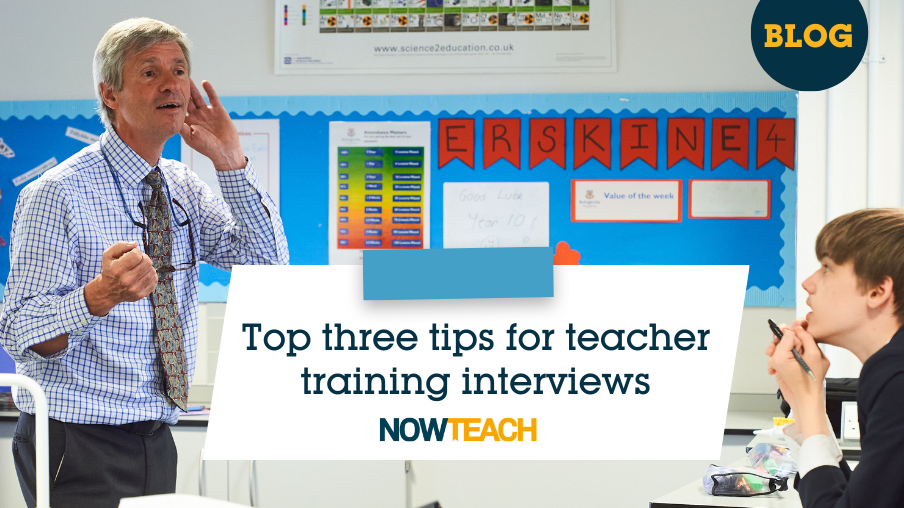Interviews. They are tough. No other word to describe them.
Everyone has their own horror stories: sweaty palms, arriving late at the wrong location, on the wrong day, with a split in your trousers or soaking wet after you left your umbrella on a bus. We have all been there!
At Now Teach, we guide people through the relatively unique process of changing career to teaching. That ranges from establishing yourself as a credible teacher in the classroom to preparing for teacher training interview questions for PGCE or QTS.
The most important thing we always say before an interview is training providers are looking for teaching potential - not the finished article.
Prepare, prepare, prepare
So, what’s our advice? My first boss used to say, ‘Fail to prepare, prepare to fail’. It may be an old cliché, but I don’t think she was wrong. And the best preparation?
Speak to someone that has already made that journey; talk to the team that have interviewed hundreds of potential teachers; and join an organisation that works with wonderful training providers up and down the country. Join Now Teach.
The most important thing we always say before an interview is training providers are looking for teaching potential - not the finished article. They are look for you to demonstrate a passion in your subject, working with children and full understanding of the role of a teacher, from the academic syllabus to pastoral responsibilities.
Here our top three tips to successfully the key questions answer without adding to your list of interview horror stories.
1. Show a Training Provider that you are committed to teaching
An interviewer will want to know that teaching is your considered career choice and that you have a clear idea of what teaching in a secondary school is like.
The goal is to show you’ve got thorough understanding of today’s schools and young people.
You can show how you’ve done this in a variety of ways; by talking to teachers, researching the curriculum, observing lessons or even volunteering or working in a local school.
Or you might be able to talk about working with young people. From having kids yourself, mentoring new recruits at work or coaching a sport, do you know something about what makes young people tick?
The goal is to show you’ve got thorough understanding of today’s schools and young people. We can help you plan your own school research after our consultation call.
2. Describe how your years of professional experience can help make you a great teacher
It’s important to be modest here – you’re applying to teacher training because you don’t know much about teaching yet. But you do have skills that will make a difference to young people once you’ve qualified.
So, reflect on how your skills relate to your subject’s curriculum and could help the school or students in different ways. Once they’ve qualified Now Teachers have used their skills in all manner of ways, from after school clubs to inputting on financial issues.
Our Specialists can help you reflect on this, so you can nail the interview and start making some career plans for beyond the first year of training.
3. Explain how you will adapt to the culture of the classroom
How you will adapt to teaching is one of the hardest things to get across because it’s an unknown. It will depend on your school and your students as much as you.
Not every lesson will go well, so you’ll need to be open to constructive feedback and able to identify how to improve.
It’s vital to be aware that teaching training is challenging, and talk about how you deal with new situations. Explain what you think the biggest change is likely to be, based on our research and knowledge of yourself.
Teacher training is a very reflective process and not every lesson will go well, so you’ll need to be open to constructive feedback and able to identify how to improve.
Schools also run in a highly structured way that is different to many other professions – it's a way of working that’s governed by the bell and a timetable.
Nick Golson, French teacher and former charity CEO, says teacher training is like being hit by the first wave when your swimming in the sea. “You can prepare yourself but it can still take your breath away. But then the second wave comes and it’s not so bad. And before you know it, you're swimming around.”
Talking to Now Teach’s Specialists and teachers in our Network will give you some top tips on how to talk about this at interview and how you can thrive as you start teaching.
So what next?
The best preparation for all this is to join Now Teach and access our support for career changers to get into teaching and thrive there.
We can’t be alongside you with spare trousers or umbrellas but - whatever happens on the way to the interview - you’ll be able to ride out any misfortunes. That's because you’ll have done all the prep you need to show you are a great candidate.
Now Teach have helped nearly 1000 career changers get through that interview. The charity was founded to help people just like you. Join us.

